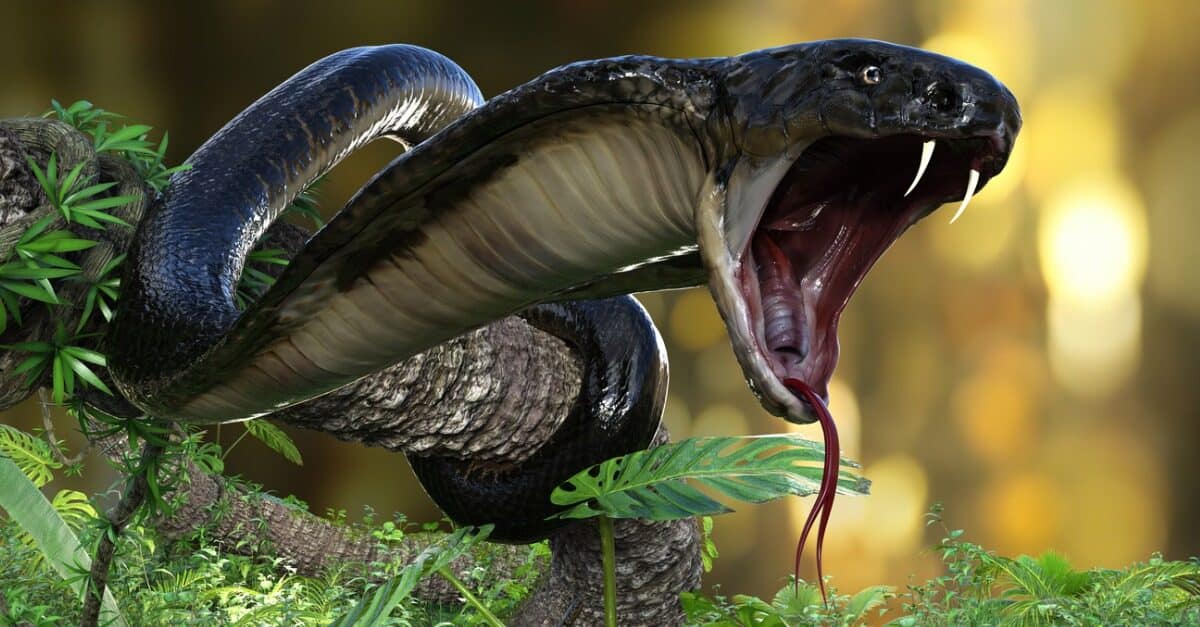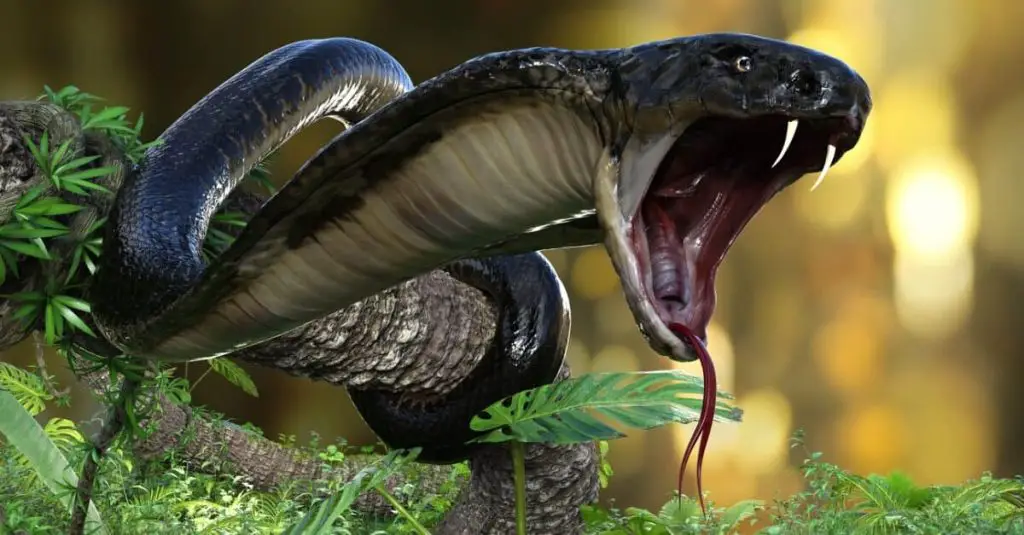The King Cobra is one of the most deadly snakes in the world, known for its potent venom and intimidating size. But just how much venom does this snake actually have? In this article, we will explore the fascinating world of the King Cobra and uncover the truth behind its venomous bite.
From its striking appearance to its deadly reputation, the King Cobra has captivated people for centuries. But despite its infamy, many questions still remain about this mysterious snake. Join us as we delve into the world of venom and discover the secrets of the King Cobra’s potent venom.
King cobras are venomous snakes found in Southeast Asia and India. They can produce up to 600 mg of venom in a single bite, which is enough to kill an elephant. The venom of a king cobra is highly toxic and contains neurotoxins that affect the nervous system, leading to paralysis and death. However, not all king cobras inject venom with every bite, and the amount of venom injected can vary depending on the size and age of the snake.

How Much Venom Does a King Cobra Have?
King cobras are one of the most venomous snakes in the world. They are found in Southeast Asia and India and are known for their impressive size and the potency of their venom. But just how much venom does a king cobra have? In this article, we will explore the answer to this question and shed some light on the dangers of encountering this deadly snake in the wild.
1. Anatomy of a King Cobra
King cobras are the longest venomous snakes in the world, measuring up to 18 feet in length. Their venom is produced in modified salivary glands located behind their eyes. When the snake bites, the venom is injected into the victim through two long, hollow fangs. Each fang can deliver a large amount of venom, making a king cobra’s bite extremely dangerous.
The venom of a king cobra is made up of various enzymes and toxins that attack the victim’s nervous system and cause paralysis, respiratory failure, and ultimately death. The potency of the venom depends on several factors, including the size and age of the snake, as well as the location of the bite.
2. How Much Venom Can a King Cobra Deliver?
A single bite from a king cobra can deliver a lethal dose of venom to a human. On average, a king cobra can deliver between 200-500 milligrams of venom in a single bite, although larger snakes can deliver up to 700 milligrams. To put this into perspective, the lethal dose of king cobra venom for a human is estimated to be around 200 milligrams.
It’s important to note that not all king cobra bites result in the delivery of venom. The snake can control the amount of venom it injects into its victim, and may use a “dry bite” if it feels threatened but does not intend to kill. However, any bite from a king cobra should be taken seriously and treated as a medical emergency.
3. Comparing King Cobra Venom to Other Snakes
King cobra venom is some of the most potent in the world, but how does it compare to other deadly snakes? The venom of a king cobra is considered to be more potent than that of a black mamba or a taipan, two other highly venomous snakes. However, the volume of venom delivered by a king cobra is less than that of a taipan or a rattlesnake.
It’s important to note that the lethality of a snake’s venom depends on a variety of factors, including the size and health of the victim, as well as the location of the bite. Regardless of the type of venom, any snake bite should be treated as a medical emergency.
4. Benefits of King Cobra Venom
While the venom of a king cobra is deadly to humans, it does have some potential medical benefits. The venom contains a variety of compounds that have been studied for their potential use in treating diseases such as cancer and Alzheimer’s. One compound found in king cobra venom, called alpha-cobratoxin, has been shown to have pain-relieving properties and is being studied as a potential treatment for chronic pain.
However, it’s important to note that these potential benefits are still being researched and have not yet been fully realized. It’s also worth noting that obtaining king cobra venom for medical research can be dangerous and should only be done by trained professionals in a controlled environment.
5. How to Avoid a King Cobra Bite
Encountering a king cobra in the wild can be a frightening experience, but there are steps you can take to avoid a bite. The first is to be aware of your surroundings and keep an eye out for snakes. King cobras are usually found in forested areas and near bodies of water, so be extra cautious in these environments.
If you do encounter a king cobra, do not approach it or attempt to handle it. These snakes are aggressive when threatened, and their venomous bite can be lethal. Instead, give the snake a wide berth and slowly back away.
6. Treatment for a King Cobra Bite
If you or someone you know has been bitten by a king cobra, it’s important to seek medical attention immediately. The first step is to immobilize the affected limb and keep the victim as still as possible. This will help slow the spread of the venom through the body.
Antivenom is the most effective treatment for a king cobra bite, but it must be administered quickly to be effective. In some cases, multiple doses of antivenom may be needed to counteract the effects of the venom.
7. Conclusion
In conclusion, a king cobra can deliver a lethal dose of venom in a single bite, with the average amount of venom delivered ranging from 200-500 milligrams. While the venom of a king cobra is highly potent, it’s important to note that not all bites result in the delivery of venom and that the lethality of the venom varies depending on the size and health of the victim.
If you encounter a king cobra in the wild, it’s important to give the snake a wide berth and seek medical attention immediately if you are bitten. While the venom of a king cobra is deadly to humans, it also has potential medical benefits that are being studied by researchers around the world.
Frequently Asked Questions:
Here are some common questions people ask about the venom of the king cobra:
What is the venom of a king cobra made of?
The venom of a king cobra is primarily made up of neurotoxins, which attack the nervous system and can cause paralysis or death. It also contains cytotoxins, which can damage tissues and cause pain, swelling, and necrosis.
Interestingly, the venom of a king cobra is not as potent as some other venomous snakes, but it can deliver a large quantity in a single bite, making it extremely dangerous.
How much venom can a king cobra deliver in one bite?
A king cobra can deliver between 200-500mg of venom in a single bite, which is enough to kill 20 people or an elephant. The amount of venom delivered can vary depending on factors such as the size of the snake and the location of the bite.
Despite the high venom yield, king cobras are generally non-aggressive and will only attack if they feel threatened or cornered.
How does the venom of a king cobra affect the human body?
The neurotoxins in king cobra venom attack the nervous system and can cause symptoms such as dizziness, blurred vision, difficulty breathing, and eventually paralysis. The cytotoxins can cause pain, swelling, and tissue damage around the bite site.
If left untreated, a king cobra bite can be fatal, as it can lead to respiratory failure or cardiac arrest. It is important to seek medical attention immediately if bitten by a king cobra or any venomous snake.
Can people survive a king cobra bite?
Survival rates for king cobra bites depend on several factors, including the amount of venom delivered, the location of the bite, and how quickly medical treatment is received. With prompt and appropriate treatment, people can recover from a king cobra bite, but it can be a long and painful process.
It is important to note that prevention is the best strategy for avoiding snake bites, as king cobras and other venomous snakes should be avoided whenever possible.
Are there any antivenoms available for king cobra bites?
Yes, there are antivenoms available for king cobra bites, although they are not widely available in all parts of the world. Antivenoms work by neutralizing the venom and preventing it from causing further damage to the body.
It is important to seek medical attention from a qualified healthcare provider if bitten by a king cobra or any venomous snake, as they can provide the appropriate treatment and antivenom if necessary.
Deadliest Job in America – Snake Milker!
In conclusion, the amount of venom a King Cobra has is enough to take down prey up to five times their size. This means that they are incredibly dangerous to humans if they feel threatened or provoked. It’s important to stay away from these deadly snakes and appreciate them from a safe distance.
Despite their deadly venom, King Cobras are an important part of the ecosystem. They help keep rodent and reptile populations in check, which in turn helps maintain a healthy balance in the food chain. Therefore, it’s important to respect these creatures and not harm them unnecessarily.
In the end, the amount of venom a King Cobra has is just one small part of what makes them so fascinating and awe-inspiring. From their unique physical characteristics to their impressive hunting abilities, these snakes continue to intrigue and captivate people all over the world.


